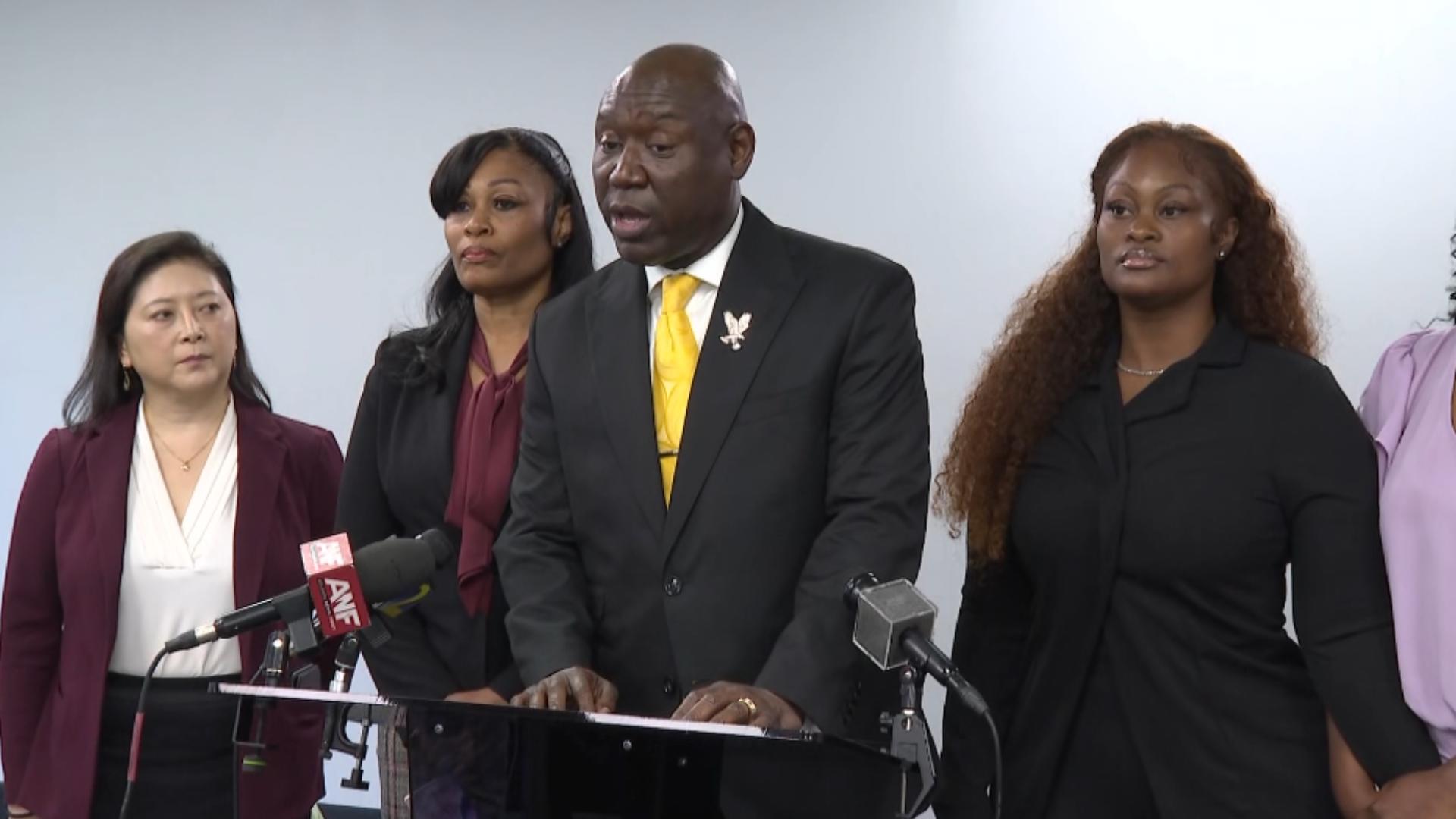ATLANTA — The family of a Georgia woman who died after seeking abortion care is now filing a lawsuit against the hospital where she attempted to receive care.
Amber Thurman, a Georgia mother featured in an in-depth ProPublica report, died in 2022. The report stated that her death was the first time an abortion-related death officially deemed "preventable" has surfaced.
On Tuesday, Attorney Ben Crump joined Amber's mother and two sisters to announce the lawsuit and elaborate on their push for justice in her death.
Attornies argued that under Georgia's abortion law, there exist exceptions that would have allowed them to operate on Thurman, even beyond six weeks of pregnancy, because her life was in jeopardy.
"If a woman's life is in jeopardy and you receive federal assistance at that hospital facility...then you have a duty to save her life," Crump said with great intensity at the start of the announcement.
He added that the issue of Thurman's death should not only raise alarms about Georgia's abortion laws but also bring attention to the severity of Black maternal health in the state.
Amber's mother, Shanette Williams, eventually took the mic and described the whole ordeal as "the hardest thing."
"It's heartbreaking...every emotion a mother could have, I had. When I walked into that hospital, I had doctors reassure me that they had my baby's interest at heart," she said, fighting back tears.
RELATED: Best friend of Georgia mom who died after seeking abortion care opens up about what happened
Amber's mother went on to describe the pain her daughter was in, adding, "When she began to cry, I knew that this was serious because my baby was a strong person."
She also described the horror of learning of her daughter's death, but the added pain of hearing it could have been prevented: "When I found out, with the world, that this was preventable, that wound that has never healed has reopened wider."
Next, Amber's two sisters spoke. Her older sister CJ began by saying, "She's gone because they allowed her to suffer," before describing their final conversation together over FaceTime.
"That look haunts me every day," she said, recounting how her sister looked blue, bruised and as though she knew she was going to die.
Even with the possibility of justice, CJ knows it can't bring her sister back, adding, "I feel like she had to be sacrificed for the greater good."
Amber's mother then talked about how her daughter had just been accepted into nursing school, but now, "that dream is shattered."
Antrica Thurman, Amber's other sister, described her as "the light in the family...she was smart, she was a mother. My sister took care of my nephew (her son) to no end. Just imagine having to tell her son he won't see her again on the day of her death."
"I have to look my nephew in the face, knowing that his mother suffered for 20 hours for something that could have been prevented," she concluded.
More on Thurman's story
At nine weeks pregnant, the ProPublica report lays out, Thurman had traveled to North Carolina for a scheduled surgical abortion. Still, he could not make it in time and was given the pills to terminate her pregnancy instead. Georgia's 2019 "heartbeat" law prohibits abortions after the point a fetal heartbeat can be detected, which is generally around six weeks. Medical professionals and women's health advocates have disputed the term "fetal heartbeat," adding that the way it's being used is misleading.
Thurman had sought an abortion after learning she was pregnant with twins, the report states, because she wanted to maintain the stability she'd worked to establish as a single mother raising her son, with a recent move out of her family's home into an apartment and plans to soon enroll in nursing school.


Thurman experienced a complication with the pills in which all the fetal tissue had not been expelled from her body. The ProPublica report describes a routine procedure, a D&C (dilation and curettage) that would clear the tissue, which she went to a metro Atlanta hospital to have performed.
Instead, she reportedly waited in a hospital bed as an infection spread, and doctors took 20 hours to operate. She had told them her miscarriage was not spontaneous but due to the abortion pills, exposing a potential legal uncertainty for the procedure where Georgia law prohibits a doctor using an instrument "with the purpose of terminating a pregnancy." In this case, while doctors would not have been terminating the pregnancy, the law only acknowledges the legality of removing a "dead unborn child" in a "naturally occurring" scenario.
The long delay in care for Thurman resulted in her death being officially deemed preventable by a Georgia Department of Public Health committee that reviews maternal mortality. Georgia has one of the highest rates for maternal mortality in the country, and it is disproportionately high for Black women.
Where Georgia's abortion law stands
A Fulton County Superior Court Judge ruled on Monday to overturn Georgia's heartbeat law.
This comes after plaintiffs, Sistersong Women of Color Reproductive Justice Collective and its members, sought a permanent injunction to prohibit the state's "Living Infants Fairness and Equality Act," or LIFE Act, from being enforced and to determine it to be unconstitutional.
In his Monday ruling, Judge Robert McBurney decided for the second time that the law is unconstitutional and said that the state or any local authority is once again enjoined from seeking to enforce the abortion ban in Georgia.
"Women are not some piece of collectively owned community property the disposition of which is decided by majority vote," Judge McBurney wrote. "Forcing a woman to carry an unwanted, not-yet-viable fetus to term violates her constitutional rights to liberty and privacy, even taking into consideration whatever bundle of rights the not-yet-viable fetus may have."
Meanwhile, the Georgia Attorney General's Office said in a statement to 11Alive that they believe the law is constitutional and will appeal this decision. Once it's appealed, it would be up to Georgia's Supreme Court again and that court has previously reversed McBurney's last decision.
“We believe Georgia’s LIFE Act is fully constitutional, and we will immediately appeal the lower court’s decision," a spokesperson with the Attorney General's Office said.
Editor's note: Amber Thurman's mother's name was originally written as Janet. This article has been updated to correct the name to Shanette Williams.

